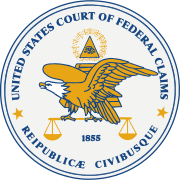| Cedillo v. Secretary of Health and Human Services | |
|---|---|
 | |
| Court | United States Court of Federal Claims |
| Decided | February 12, 2009 |
| Transcript | Available here |
| Case history | |
| Appealed to | United States Court of Appeals for the Federal Circuit |
| Subsequent action | Upheld at Appeal |
| Court membership | |
| Judge sitting | George Hastings |
Michelle Cedillo v. Secretary of Health and Human Services, also known as Cedillo, was a court case involving the family of Michelle Cedillo, an autistic girl whose parents sued the United States government because they believed that her autism was caused by her receipt of both the measles-mumps-and-rubella vaccine (also known as the MMR vaccine) and thimerosal-containing vaccines. The case was a part of the Omnibus Autism Proceeding, where petitioners were required to present three test cases for each proposed mechanism by which vaccines had, according to them, caused their children's autism; Cedillo was the first such case for the MMR-and-thimerosal hypothesis.
The family sought compensation from the National Vaccine Injury Compensation Program (NVICP), but in order to qualify they were required to prove that it was more likely than not that their children's autism was caused by their vaccines. The scientific community had concluded that vaccines did not cause autism years before the first cases were heard, and concern was therefore expressed that the relatively lax evidentiary standards of the NVICP could lead to compensation being awarded in spite of the compelling scientific evidence to the contrary. This, some vaccine supporters argued, might have serious adverse public health effects by discouraging vaccine manufacturers from producing more childhood vaccines. Though the NVICP had existed since 1988, it was not designed to handle the thousands of cases it received from 1999 to 2007, which led to the establishment of the Omnibus Autism Proceeding in 2002.
The trial opened on June 11, 2007, in Washington, D.C. The Cedillos' six expert witnesses argued that thimerosal-containing vaccines degraded Michelle's immune system, which in turn made it possible for the weakened measles virus in the MMR vaccine to cause a persistent infection leading to autism. In support of this hypothesis, the Cedillos' witnesses relied on the reported detection of measles virus in Michelle's gastrointestinal tract by John O'Leary's Unigenetics laboratory in Dublin. However, the government's expert witnesses conclusively demonstrated that O'Leary's positive results were caused by contamination in the Unigenetics lab rather than an actual infection.
On February 12, 2009, the special masters ruled that the Cedillos were not entitled to compensation as they had failed to demonstrate that thimerosal-containing vaccines in combination with the MMR vaccine could cause autism. The special masters concluded, among other things, that the government's experts were considerably more qualified than those testifying on behalf of the families, with special master George Hastings stating that "the Cedillos have been misled by physicians who are guilty, in my view, of gross medical misjudgment."